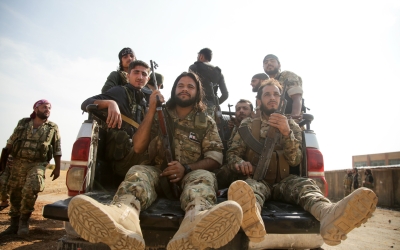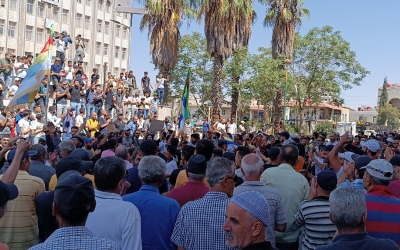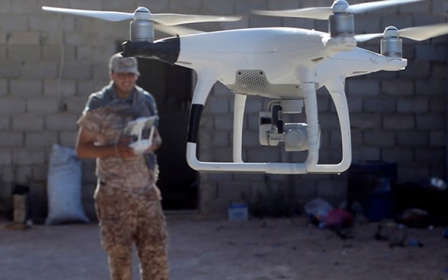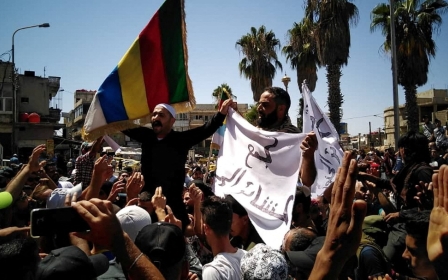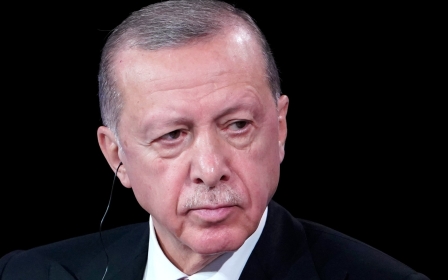Syrian rebels sent to Africa to guard mines and businesses
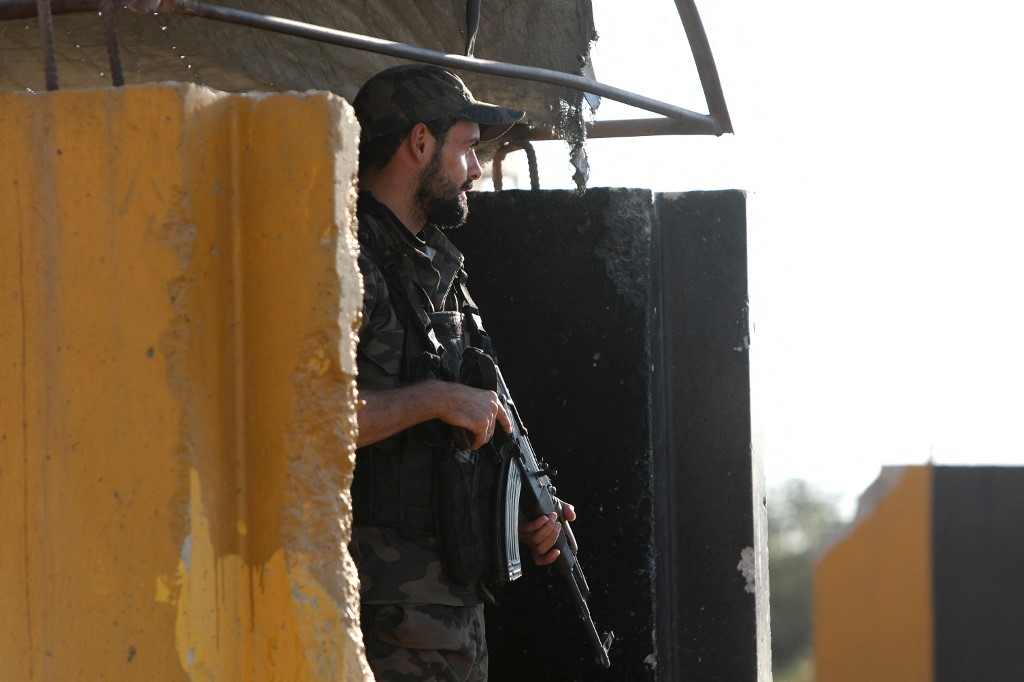
Syrian rebels have been hired to fight and provide security at gold mines and factories in African countries, several rebel sources told Middle East Eye this week.
Syrian fighters, who are mostly affiliated with the Syrian National Army (SNA), a coalition of armed opposition groups that works closely with Turkey in northern Syria, told MEE that hundreds of fighters were deployed in Burkina Faso, Niger and Nigeria.
There they guard Turkish-operated businesses, factories and mines, or provide protection services in countries where the Islamic State group poses a danger to local security.
An SNA fighter using the pseudonym Deyri, who was recruited for a mission in Africa, told MEE that the recruits weren’t operating alone but in groups.
“The command is not in Syrian hands. Sometimes we sign up for the protection of Turkish businesses, sometimes for fighting the Islamic State, and sometimes for guarding mines or factories,” he said.
New MEE newsletter: Jerusalem Dispatch
Sign up to get the latest insights and analysis on Israel-Palestine, alongside Turkey Unpacked and other MEE newsletters
Reports of Syrian rebels being sent to Africa first surfaced in the western media, which said they had been given short-term combat training before deployment. MEE could not identify which organisation trained the recruits.
SNA members told the media that they were recruited through the Sultan Murad Brigade faction, and signed contracts ranging from six months to a year for a monthly salary of $1,500.
According to reports, the controversial private Turkish military company SADAT is allegedly behind the recruitment of SNA members for Africa. However, the company’s executives frequently deny these allegations.
Turkish opposition parties have long claimed that SADAT, led by a former Turkish presidential adviser, functioned as a private military company that is used in secretive Turkish state operations in the Middle East.
SADAT has repeatedly denied such allegations and asked for proof. The company says it is transparently engaging states in the region for only advisory and training roles.
Deyri, the rebel, said that he could not confirm the allegations regarding SADAT’s involvement. “I’ve heard their name before, but I signed with Sultan Murat,” he said.
At least 500 Syrian fighters sent to Africa
Rebel sources said the first group that has been deployed, in February, included at least 500 fighters, with many staying in Niger and others leaving for Nigeria and Burkina Faso. Those West African countries purchased Turkish military-grade drones last year.
The rebels' recruitment is believed to have begun in October.
Another SNA member currently in Niger, speaking under the pseudonym Mahmut, told MEE that he has been assigned a protection mission, while avoiding giving further details.
Both Mahmut and Deyri said they belong to different groups within the SNA but signed their contracts with the Sultan Murad Brigade, a Turkmen division supported by Turkey.
The rebels gave conflicting accounts of how many SNA factions were involved and how many fighters were deployed.
However, they confirmed that at least five SNA groups have directed their fighters and some commanders to the three African countries.
Turkey has previously deployed Syrian fighters to Libya to back a Tripoli-based administration locked in a civil conflict, and supplied them to Azerbaijan when it was fighting Armenian forces in Nagorno-Karabakh.
Ankara's use of armed drones, Syrian forces and Turkish commanders is believed to have been key to helping repel eastern commander Khalifa Haftar’s forces from taking Tripoli in 2020. Similar tactics proved useful as Azerbaijan conquered Nagorno-Karabakh in 2020.
Turkey officially denied it deployed foreign forces to such theatres, but sources told MEE in December 2019 that Ankara had planned to deploy Syrian rebel fighters in Libya to fight against Haftar's forces.
‘The only job sector is being a mercenary”
A senior Syrian rebel commander told MEE that Turkey's recruitment of SNA members for work in Africa has been a topic of controversy among opposition armed groups from the beginning.
“We have a special alliance and brotherhood with Turkey. However, this relationship has been exploited by some greedy commanders over time,” he said.
“Many groups that maintain their revolutionary essence [against the rule of Syrian President Bashar al-Assad] and deep brotherhood and alliance with Turkey have not sent fighters to Libya, Azerbaijan, or any other country. The problem is that the entire SNA is being labelled as mercenaries due to the ambitions of a few commanders.”
‘The problem is that the entire SNA is being labelled as mercenaries due to the ambitions of a few commanders’
- A senior SNA commander
A second SNA commander said he believes that unemployment and poverty caused by the prolonged war, which affects 90 percent of the Syrian population, has pushed fighters to work as mercenaries abroad to make a living.
The commander served for many years in the Free Syrian Army, the wide coalition of opposition groups created at the beginning of the war in 2011, and then moved to areas under Turkish control after losing battles against al-Qaeda former affiliate the Nusra Front, now known as Hay'at Tahrir al-Sham.
He said rebel-held areas of northern Syria had seen aid flow disrupted by Russian and Chinese pressure, referring to UN Security Council votes that have imperilled relief efforts. The World Food Programme has ended its mandate for the country as of 2024.
“Today, an SNA fighter tries to support his family with a salary of 1,500 Turkish lira [$47], of which half is taken by commanders as kickback,” the second commander said.
“From Afrin to Hasakah, from Damascus to Abu Kamal, the only job sector needing manpower nationwide is being a mercenary.”
A lawyer in areas controlled by the opposition Syrian Interim Government in northern Syria said rebel deployments abroad pit revolutionaries against mercenaries.
“Commanders who gain power and money from missions abroad have moved away from the revolution and established their small empires,” he told MEE.
“They stopped following the rules. They thought their crimes would be overlooked. And they were right. Turkey ignored the crimes committed,” he added, in reference to the human rights violations that have been documented in the parts of northern Syria controlled by the SNA.
The lawyer also believes that mercenary activities have a negative impact on the cause of the Syrian revolution.
“The missions outside Syria weaken the political representation of the Syrian opposition as well as its legitimacy in the public eye.”
Middle East Eye delivers independent and unrivalled coverage and analysis of the Middle East, North Africa and beyond. To learn more about republishing this content and the associated fees, please fill out this form. More about MEE can be found here.


